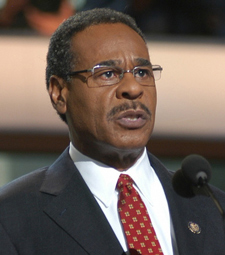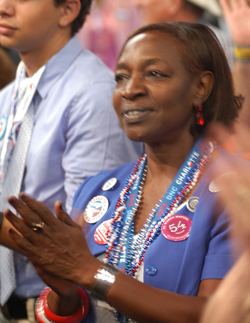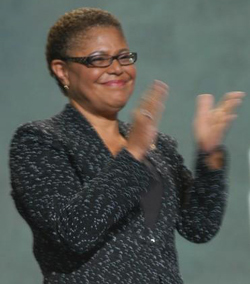Black Caucus backs Obama, Black vote critical for success
By Richard B. Muhammad -Editor- | Last updated: Sep 11, 2012 - 6:09:44 PMWhat's your opinion on this article?
CHARLOTTE, N.C. (FinalCall.com) - The crowd inside roared and applauded as Rep. Emanuel Cleaver II put his preacher’s skills to work and turned the Democratic Convention session into a place to shout and bear witness. It wasn’t passion devoted to religion, but fiery declarations of support for President Obama, the blessing of a diverse America and a vow to endure any hardship and GOP ridicule to keep the current commander in chief in office.

Missouri Democrat Emanuel Cleaver brought crowd alive with passionate address to DNC 2012 in Charlotte, N.C. Photos: Richard B. Muhammad
|
Preceded by Rep. Karen Bass of California and Rep. Al Green of Texas, it was the Missouri lawmaker who drove the message and the enthusiasm deeply into the audience: “President Barack Obama has been lampooned for speaking of hope; hope for a better America. I want to encourage him and all of us to continue to hope for an America that remembers, recognizes, and fervently protects its greatness,” said the lawmaker, who is also a Methodist preacher.
“Hope is the motivation that empowers the unemployed, enabling them to get out of bed every single morning with unbounded enthusiasm as they look for work. It is our hope and faith that move us to action,” he said. “It is our hope that instructs us to march on!”
While the Republicans may deride the Democrats as the party with a caucus for everyone, including those who have no caucus, it is diversity that makes the party and country strong, Rep. Cleaver argued.
“God did not burden the United States with a diversity of backgrounds, ideas and religions, he blessed America with them,” continued Rep. Cleaver.
There is too much division in Congress, which is hurting the country, and leaving work needed for ordinary Americans undone, he said.
“This must change, because just as bees cannot sting and make honey at the same time, members of Congress cannot simultaneously make passionate enemies and expect political progress,” said the veteran lawmaker.

|
Protecting those gains against Republican determination to go backward and faith in the future requires “marching through our communities to make sure everyone is registered and ready to vote,” he said.
“And we, with our diversity and our differences, are all in this together,” he declared as the crowd roared. The cheering grew louder as he proclaimed the “we” was bigger than Blacks, bigger than Democrats and included “all Americans,” who are suffering.
“Either we move forward towards securing an economic future built to last with a strong middle class at its core, or we revert to a place where America’s promise is only fulfilled for a select few,” added Rep. Green.
“People of all races, religions, and backgrounds joined together and fought for (Voting Rights) because every one of us deserves a fair shake and a fair chance at achieving our version of the American dream, the right to vote gives us the power to take our future into our own hands,” Rep. Bass reminded the audience.
“We must use that power today, so that we do not lose it tomorrow,” she said.
“More than 41 years ago, when the Congressional Black Caucus was founded, that was our charge, and it still is—a vote and a voice in choosing our leaders, passing our laws and setting the course for our nation. And for the future we seek, a future of greater opportunity for all of us, we stand with President Obama in setting that path forward,” Rep. Bass said.
With the election already tight and little change expected, turning out the Democratic base, which includes the Black vote is critical. Black voters can tip the scales for Mr. Obama to win in several states.
According to the National Urban League Research Institute, voter turnout of 64.7 percent in 2008 helped put the first Black president in office. If Black turnout falls to 60 percent the president could lose North Carolina this time around; and it could be hard to win Ohio and Virginia. The Black vote is also vital in Pennsylvania.
In a recent poll, Republican nominee Mitt Romney got zero percent of the Black vote.

Rep. Karen Bass of California urged the crowd to fight voter suppression and protect voting rights. Photo: Richard B. Muhammad
|
“In addition to these six states, President Obama is competitive in Florida (29) and North Carolina (15). While there is little question about the direction of black vote this November, the size of black turnout will be important in determining the outcome of the election,” noted the report released Sept. 4 as the convention opened.
“Several of the states that President Obama won in 2008 that now appear to be likely to be more competitive have significant black populations, including the key states of Florida, North Carolina, Ohio and Virginia. The black vote is also important in a few of the states that Senator Kerry won in 2004, such as, Michigan and Pennsylvania,” the report added.
Changes to voter i.d. requirements in Philadelphia and several other states have raised concerns as have efforts to stop or block Black voting, which were serious problems in Ohio and Florida in 2008.
INSIDE STORIES AND REVIEWS
-
-
About Harriett ... and the Negro Hollywood Road Show
By Rabiah Muhammad, Guest Columnist » Full Story -
Skepticism greets Jay-Z, NFL talk of inspiring change
By Bryan 18X Crawford and Richard B. Muhammad The Final Call Newspaper @TheFinalCall » Full Story -
The painful problem of Black girls and suicide
By Charlene Muhammad -National Correspondent- » Full Story -
Exploitation of Innocence - Report: Perceptions, policies hurting Black girls
By Charlene Muhammad -National Correspondent- » Full Story -
Big Ballin: Big ideas fuel a father’s Big Baller Brand and brash business sense
By Bryan Crawford -Contributing Writer- » Full Story






 Click Here Stay Connected!
Click Here Stay Connected!








